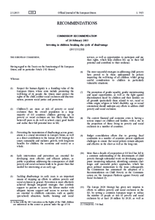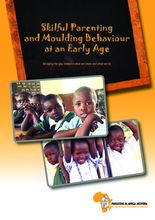Displaying 161 - 170 of 262
This Recommendation by the European Commission on Investing in Children, stresses the importance of early intervention and preventative approaches, and makes quality childcare one of its key policy areas to break the cycle of disadvantage in early years and reduce the risk of child poverty and social exclusion.
This new study by Parenting in Africa Network (PAN) was conducted in three regions in Kenya (Nairobi, Mombasa and Busia), involving primary care givers of children age 0-8, children participating in Early Childhood Development and Education centers, and stakeholders and professionals involved in skillful parenting and early childhood development.
The objective of this study was to investigate which model of care and support is more appropriate for improving psychosocial and economic security of AIDS orphans in Nepal.
This study aims to determine the prevalence of maltreatment experienced by institutionalized children prior to their admission to Charitable Children's Institutions (orphanages) in western Kenya, and to describe their socio-demographic characteris
This Child Welfare Information Gateway bulletin for professionals in the US discusses what chronic neglect is and reviews ways to work with families experiencing chronic neglect, including critical elements of successful casework practice, examples of what agencies are doing, and ways agencies can integrate child welfare approaches to chronic neglect with prevention and early intervention efforts.
The World Family Map Project is a new initiative by Child Trends to monitor the health of family life around the globe and to learn more about how family trends affect the well-being of children. Using internationally comparative data for low-, middle-, and high-income countries on key characteristics of families, including family structure, family socioeconomics, family processes, and family culture, the Map looks at trends in 45 countries, representing every region of the world.
This brief outlines the common ground between the World Bank and UNICEF in their commitment in developing and strengthening social protection systems and calls on other stakeholders to engage collaboratively to build such systems and expand their coverage.
This manual is the main outcome of the European Commission Daphne III programme, Prevent and Combat Child Abuse: What works? Involving regional exchanges and research from five countries (Germany, Hungary, Portugal, Sweden and the Netherlands), this manual brings together knowledge on what works in tackling child abuse. The manual suggests evidence and practice-based prevention and response strategies against child abuse and neglect, including programs and services that have been shown to be successful in strengthening family care.
The Minimum Standards for Child Protection in Humanitarian Action were formulated in 2011-2012 by the Child Protection Working Group (CPWG), an inter-agency working group composed of child protection practitioners, academics, and policy makers working to support child protection work in humanitarian settings.
This policy brief from the World Bank provides an overview of cash transfers in African countries.









